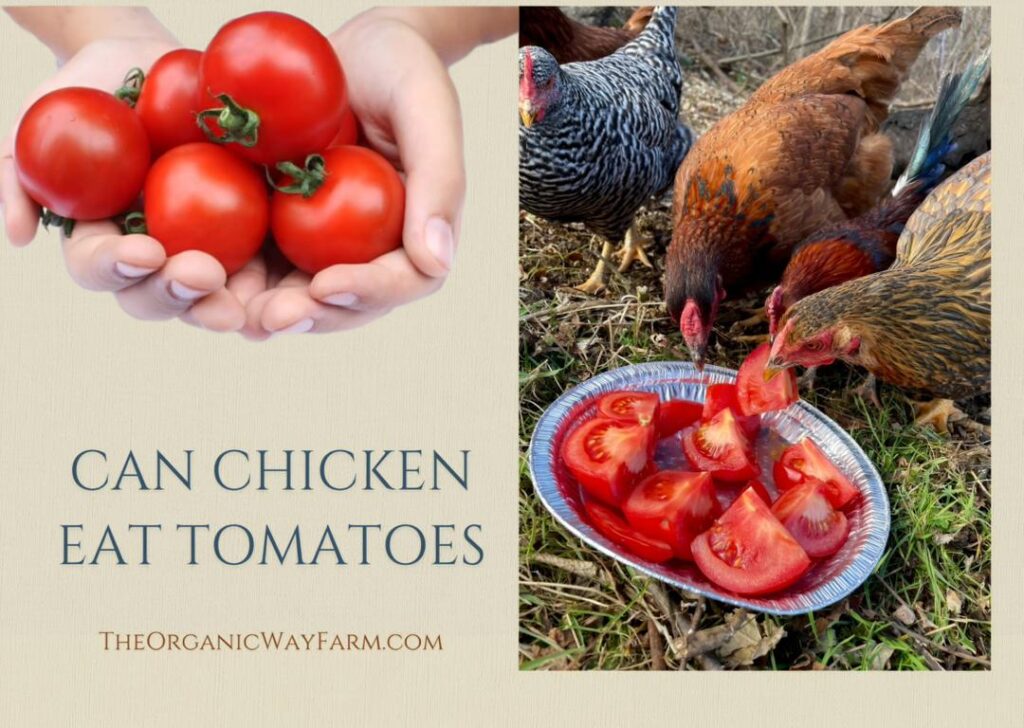If you are a chicken keeper or thinking about raising chickens, you might have found yourself asking, “Can chickens eat tomatoes?” This is a great question! Chickens are known for their curious nature and love exploring various foods. As their caretakers, we want to ensure their meals are not only tasty but also healthy. Let’s get right into it and find out if tomatoes can be part of their diet!
The short answer is YES, chickens can eat tomatoes. However, there are some important details to consider. Not all parts of the tomato plant are safe for our feathered friends. While the fruit itself is generally safe and nutritious, the green parts like the stems and leaves contain harmful substances that could affect our chickens’ health. So, what exactly do we need to know about feeding tomatoes to chickens?
We have gathered all the information you need and will explore some important questions regarding this juicy fruit! Keep reading to learn about the best practices, benefits, and potential risks of incorporating tomatoes into your chickens’ diet. Here’s what we will be covering in this article:
- Can Chickens Eat Tomatoes?
- How Much Tomatoes Can Chickens Eat?
- Best Way to Feed Tomatoes to Chickens
- Benefits of Feeding Tomatoes to Chickens
- Dangers of Feeding Tomatoes to Chickens?
- Substitute of Tomatoes for Chickens?
Let’s get started!
Can Chickens Eat Tomatoes?

Yes, chickens can eat tomatoes and many of them enjoy this juicy fruit! Tomatoes are loaded with moisture, making them a delightful treat, especially on warm days. They consist mostly of water, which helps keep our chickens hydrated. In feeding tomatoes, we are not only providing an additional food source but also contributing to our birds’ overall well-being.
As we mentioned earlier, the fruit of the tomato is safe for chickens. The ripe, red fruit is packed with vitamins, minerals, and antioxidants that can greatly support their health. However, we should be cautious and avoid feeding them any green tomatoes, stems, leaves, or unripe parts. These components contain solanine, a harmful chemical that can be toxic to chickens. By sticking to ripe tomatoes, we can safely incorporate them into our chickens’ diets.
How Much Tomatoes Can Chickens Eat?
When we talk about how much tomatoes can be fed to chickens, moderation is key. Even though tomatoes are generally safe, they should only be given as a treat rather than a primary food source. Chickens thrive on a balanced diet that is primarily made up of high-quality commercial feed, grains, and greens, which should make up about 90% of their diet.
As a good rule of thumb, think of treats like tomatoes as a snack. We can offer our chickens a small amount—a few slices or chunks will suffice. Too much of any treat can lead to dietary imbalance, and tomatoes are no exception. Aim to make treats such as tomatoes no more than 10% of their overall diet!
It is best to introduce tomatoes to them slowly, especially if they have not had this fruit before. Monitor their reaction to the new food, and if they seem to enjoy it, we can continue to include it in their diet. Observing our chickens helps us understand their preferences and maintain their health.
Best Way to Feed Tomatoes to Chickens
Feeding tomatoes to our chickens can be done in various ways! We will see how we can make this fruit a fun and enjoyable treat for them. One effective way is to present tomatoes whole or cut them into chunks and scatter them in their living area. This encourages foraging behavior, which is important for their physical and mental stimulation.
Another option is to chop tomatoes into smaller pieces and mix them into their feed. This approach ensures that the chickens get a taste of the fruit while still having their balanced diet intact. Mixing fresh fruits and vegetables into their regular feed can help them become accustomed to new tastes.
Some chicken owners like to create a ‘treat board’ where they can attach or hang various fruits, including tomatoes. This way, our chickens have the option to peck at their treats throughout the day, providing them with an entertaining way to eat. Ensuring a diverse diet is crucial as this promotes their mental engagement.
It’s also wise to wash tomatoes thoroughly to remove any pesticides, dirt, or chemicals before offering them to our chickens. Once we have prepared the tomatoes and presented them in a fun way, we can sit back and enjoy watching our chickens flock to their new snack!
Benefits of Feeding Tomatoes to Chickens
Hydration
One of the primary benefits of feeding tomatoes to chickens is hydration. As we mentioned before, tomatoes have a high-water content, which helps our feathered friends stay hydrated, especially during hot summer days! Keeping hydrated is important for laying hens and overall good health, as chickens can easily become dehydrated in warm weather.
Fiber
Tomatoes also provide dietary fiber, which is important for our chickens’ digestive health. Fiber helps regulate their digestive system and ensures that food moves smoothly through their intestines. Proper digestion is critical for chickens, and a healthy digestive tract can lead to improved nutrient absorption from their usual feeds.
Vitamins and minerals
Incorporating tomatoes into our chickens’ diet means offering them a nutritious boost! Tomatoes contain a variety of vitamins, including A, C, K, and several B vitamins. Vitamin A is essential for vision and immune function, while vitamin C contributes to overall health and resilience against disease. Including foods rich in these vitamins can give our chickens a better chance of thriving.
Mental stimulation
Providing tomatoes as a treat can also contribute to the mental well-being of our chickens. Chickens are curious birds, and offering them new foods can keep their flock engaged and active. The act of pecking and searching for pieces of tomato provides a form of enrichment that can help reduce boredom and stress.
Nutritional breakdown of tomatoes
When it comes to the nutritional breakdown of tomatoes, they are truly impressive! Tomatoes are low in calories but rich in nutrients. For example, a single medium-sized tomato has about 22 calories, 1 gram of protein, and 5 grams of carbohydrates. Additionally, they provide significant amounts of potassium, folate, and antioxidants such as lycopene, which has been shown to help fight inflammation and improve heart health.
Dangers of Feeding Tomatoes to Chickens?
While tomatoes can be a delicious treat for chickens, it is important to recognize the potential risks associated with feeding them this fruit. As mentioned earlier, not all parts of the tomato plant are safe. The green parts contain solanine, a toxic compound that can make chickens sick if consumed in large amounts. Symptoms of solanine poisoning can include lethargy, digestive upset, and even more severe health issues.
Therefore, we must always ensure that only ripe tomatoes are offered, and all green parts of the plant are removed before feeding them to our flock. Giving chickens overripe or rotten tomatoes should also be avoided, as it can lead to digestive problems and may even attract harmful bacteria.
Another consideration is that tomatoes are acidic, and feeding them too frequently can lead to digestive upset. While a few pieces occasionally are fine, they should not be considered a staple in their diet. Moderation is essential in keeping our chickens happy and healthy!
Being aware of potential allergic reactions or sensitivities is also important. Although rare, some chickens may have adverse reactions to certain foods. Keep an eye on our birds after introducing any new treats, including tomatoes, to ensure they are enjoying it without any negative effects.
Substitute of Tomatoes for Chickens?
If we are looking for alternatives or substitutions for tomatoes, we have several options that also offer health benefits! Some fruits and vegetables that can be used as substitutes for tomatoes include cucumbers, bell peppers, and berries. Cucumbers have high water content and can contribute to hydration, while bell peppers are loaded with vitamins and can provide a sweet crunch!
Berries, such as strawberries and blueberries, are also excellent sources of antioxidants and nutrients. They are easy for chickens to pick up and enjoy, making them another fun treat. Just like with tomatoes, it’s important to ensure these alternatives are fresh and give them in moderation.
Providing a variety of treats can help keep our chickens engaged and encourage them to explore different tastes. Mixing and matching can result in a well-rounded diet. It’s always a good idea to experiment with different fruits and vegetables, ensuring that we maintain a balanced approach with their primary feeds. This variety helps ensure good health and prevents boredom in our flocks!
Can Chickens Eat Tomatoes? Frequently Asked Questions
Are all types of tomatoes safe for chickens?
Only ripe tomatoes are safe. Uneaten green parts or unripe tomatoes should be avoided.
Can chickens eat tomato sauce?
It is not recommended to feed chickens tomato sauce, as it may contain added sugars or seasonings that can be harmful.
How should I prepare tomatoes for my chickens?
You can give tomatoes whole, cut them into chunks, or mash them up. Be sure to wash them beforehand!
Can I use rotten tomatoes for chickens?
Never feed rotten tomatoes. They can cause infections and digestive problems.
How often can I give my chickens tomatoes?
Tomatoes should be given occasionally as a treat, making up no more than 10% of their overall diet.
Final Thoughts
In conclusion, chickens can enjoy tomatoes as a tasty treat! They offer hydration, fiber, vitamins, and mental stimulation, making them a wonderful addition to our feathered friends’ diets. However, we should remember that moderation is key, and we should only provide ripe tomatoes while avoiding green parts and any risks associated with feeding them improperly. By keeping our chickens’ diets varied and balanced, we are setting them up for happy and healthy lives!
If you found this article helpful, check out these other engaging topics on our site: The Dangers of Feeding Chickens Certain Foods, Best Treats for Chickens and How to Keep Your Chickens Entertained. Thanks for reading!






